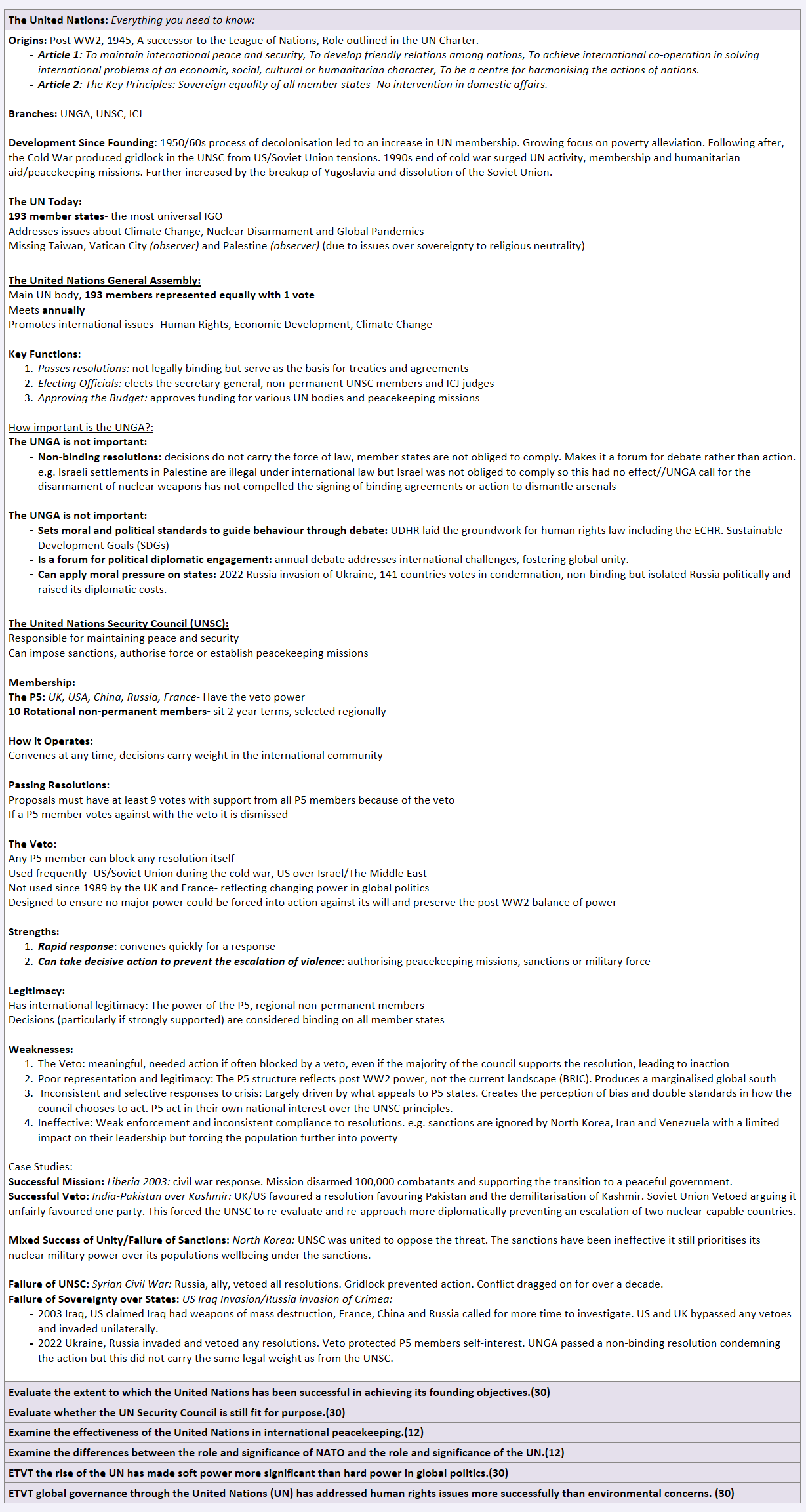The United Nations Notes
The United Nations: Everything you need to know: |
Origins: Post WW2, 1945, A successor to the League of Nations, Role outlined in the UN Charter.
Branches: UNGA, UNSC, ICJ
Development Since Founding: 1950/60s process of decolonisation led to an increase in UN membership. Growing focus on poverty alleviation. Following after, the Cold War produced gridlock in the UNSC from US/Soviet Union tensions. 1990s end of cold war surged UN activity, membership and humanitarian aid/peacekeeping missions. Further increased by the breakup of Yugoslavia and dissolution of the Soviet Union.
The UN Today: 193 member states- the most universal IGO Addresses issues about Climate Change, Nuclear Disarmament and Global Pandemics Missing Taiwan, Vatican City (observer) and Palestine (observer) (due to issues over sovereignty to religious neutrality)
|
The United Nations General Assembly: Main UN body, 193 members represented equally with 1 vote Meets annually Promotes international issues- Human Rights, Economic Development, Climate Change
Key Functions:
How important is the UNGA?: The UNGA is not important:
The UNGA is not important:
|
The United Nations Security Council (UNSC): Responsible for maintaining peace and security Can impose sanctions, authorise force or establish peacekeeping missions
Membership: The P5: UK, USA, China, Russia, France- Have the veto power 10 Rotational non-permanent members- sit 2 year terms, selected regionally
How it Operates: Convenes at any time, decisions carry weight in the international community
Passing Resolutions: Proposals must have at least 9 votes with support from all P5 members because of the veto If a P5 member votes against with the veto it is dismissed
The Veto: Any P5 member can block any resolution itself Used frequently- US/Soviet Union during the cold war, US over Israel/The Middle East Not used since 1989 by the UK and France- reflecting changing power in global politics Designed to ensure no major power could be forced into action against its will and preserve the post WW2 balance of power
Strengths:
Legitimacy: Has international legitimacy: The power of the P5, regional non-permanent members Decisions (particularly if strongly supported) are considered binding on all member states
Weaknesses:
Case Studies: Successful Mission: Liberia 2003: civil war response. Mission disarmed 100,000 combatants and supporting the transition to a peaceful government. Successful Veto: India-Pakistan over Kashmir: UK/US favoured a resolution favouring Pakistan and the demilitarisation of Kashmir. Soviet Union Vetoed arguing it unfairly favoured one party. This forced the UNSC to re-evaluate and re-approach more diplomatically preventing an escalation of two nuclear-capable countries.
Mixed Success of Unity/Failure of Sanctions: North Korea: UNSC was united to oppose the threat. The sanctions have been ineffective it still prioritises its nuclear military power over its populations wellbeing under the sanctions.
Failure of UNSC: Syrian Civil War: Russia, ally, vetoed all resolutions. Gridlock prevented action. Conflict dragged on for over a decade. Failure of Sovereignty over States: US Iraq Invasion/Russia invasion of Crimea:
|
Evaluate the extent to which the United Nations has been successful in achieving its founding objectives.(30) |
Evaluate whether the UN Security Council is still fit for purpose.(30) |
Examine the effectiveness of the United Nations in international peacekeeping.(12) |
Examine the differences between the role and significance of NATO and the role and significance of the UN.(12) |
ETVT the rise of the UN has made soft power more significant than hard power in global politics.(30) |
ETVT global governance through the United Nations (UN) has addressed human rights issues more successfully than environmental concerns. (30)  |